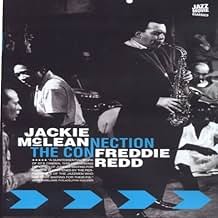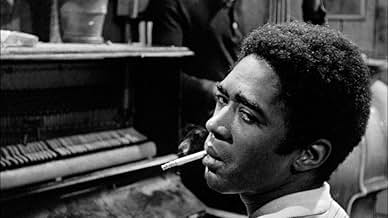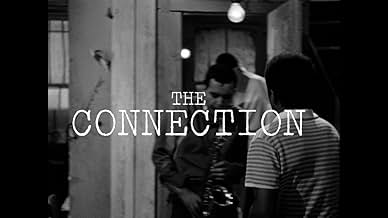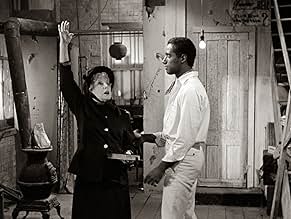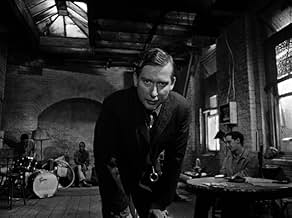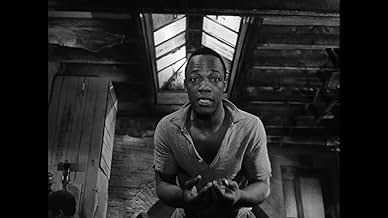CALIFICACIÓN DE IMDb
7.0/10
1.1 k
TU CALIFICACIÓN
Agrega una trama en tu idiomaMen sent their own way await heroin in Leach's apartment.Men sent their own way await heroin in Leach's apartment.Men sent their own way await heroin in Leach's apartment.
Jerome Raphael
- Solly
- (as Jerome Raphel)
Jim Anderson
- Sam
- (as James Anderson)
Roscoe Lee Browne
- J.J. Burden
- (as Roscoe Browne)
Opiniones destacadas
I'd like to clear up this jazz/heroin confusion (ignorance) that may stop you from watching this great film. Leach is the connection to Cowboy, and Cowboy is the connection to a dealer. The IMDb plot summary says that Cowboy is bringing "the connection" back to Leach's house, but he is really just bringing heroin. The fact that some of the people waiting for heroin are jazz musicians doesn't mean all jazz musicians were addicts, although most of the good ones were. With that said, I would advise any bee-bop fan to watch this film just for the amazing, and sole, footage of Blue Note heavies Jackie McLean and Freddie Redd. You will most likely also like the free-jazz directorial treatment of what was originally a stage play. The film also deserves credit for it's honest portrayal (in 1961!) of heroin addiction, neither glamorizing nor condemning it. The only problem I had was the slightly over-theatrical styles of some of the actors. Overacting did become the Leach character, however: "OHHH, MY BOIL!!!" If you liked "The Incident" or "The Pawnbroker," you'll like this one.
I don't know why anyone would call this realistic. It looks and feels like a play...the "acting", the overblown dialogue (almost Odets-like), etc. And unless you were a junkie in 1961, how would you know if it's realistic? And Sister Salvation? How could that possibly be real?! Noone is that clueless.
It's obviously dated for many reasons....the "lingo", the lack of serious profanity, the odd discussion of homosexuality.
Still, the film hooks you in...and I'm not exactly sure why. I guess it never really slows down. The camera tricks are cool, the band is great, some good dialogue. And the acting and characters are interesting, if not realistic.
Worth seeing...
It's obviously dated for many reasons....the "lingo", the lack of serious profanity, the odd discussion of homosexuality.
Still, the film hooks you in...and I'm not exactly sure why. I guess it never really slows down. The camera tricks are cool, the band is great, some good dialogue. And the acting and characters are interesting, if not realistic.
Worth seeing...
A remarkably tense and anxious little film about a group of junky musicians "waiting for their man" in a New York flophouse loft. They're joined by a documentary film crew (just a director and a cameraman) whose goal seems to be some sort of cinéma vérité about the life of junky musicians who wait in flophouse lofts.
After a few introductions, and comical "act natural" type instructions from the documentary director, the characters take turns addressing the camera. They nervously rant, philosophize, and insult each other, interrupted occasionally by improvised jazz from several legitimate musicians in the cast (most notably pianist Freddie Redd and tenor sax player Jackie McLean). The anxiety they feel as they wait for their fix is brilliantly conveyed by both the actors and the director (this time I mean the real director, Shirley Clarke, not the actor portraying the documentary director, got it?)
Much of this conveyed anxiety comes from the fact that the film is a strange and slightly unsettling mix of stark realism and stage acting (it is a filmed version of a play from the New York theater scene of the day). This is an unusual film and it honestly takes some getting used to, though probably less now taking into account the glut of nauseatingly self-conscious "mockumentaries" and hyper-stylized "reality shows" we are plagued with today.
The Connection is something different, matching edgy subject matter with edgy film-making the producers were working very much without a net. Consequently some might think it ends in disaster, I think it's a highly interesting experiment that's well worth watching.
After a few introductions, and comical "act natural" type instructions from the documentary director, the characters take turns addressing the camera. They nervously rant, philosophize, and insult each other, interrupted occasionally by improvised jazz from several legitimate musicians in the cast (most notably pianist Freddie Redd and tenor sax player Jackie McLean). The anxiety they feel as they wait for their fix is brilliantly conveyed by both the actors and the director (this time I mean the real director, Shirley Clarke, not the actor portraying the documentary director, got it?)
Much of this conveyed anxiety comes from the fact that the film is a strange and slightly unsettling mix of stark realism and stage acting (it is a filmed version of a play from the New York theater scene of the day). This is an unusual film and it honestly takes some getting used to, though probably less now taking into account the glut of nauseatingly self-conscious "mockumentaries" and hyper-stylized "reality shows" we are plagued with today.
The Connection is something different, matching edgy subject matter with edgy film-making the producers were working very much without a net. Consequently some might think it ends in disaster, I think it's a highly interesting experiment that's well worth watching.
I first saw this movie in 1963 by hassling the cashier into selling me a ticket though I was under 18. I can't remember what I expected, but it was so interesting to me that I came back with a couple of underage friends--and got in again. This is a very sophisticated film not only for its time, but for now. There is no surprise ending or plot twist, but the use of the film-within-a-film allows the characters to relate to the outside world even though all the action takes place within one studio apartment. And what they have to say makes as much sense now as it did then. This is a film that could be re-shot with a minor change of clothing style and would look and sound cutting edge.
While "Traffic", in its glossy, artfully edited, mainstream way, explores the glossy, mainstream life of at least some drug traffickers, "The Connection", in its gritty, black-and-white, hand-held way, explores the gritty, hand-held life of at least some of the customers.
I would recommend this film for anyone who is interested in serious exploration of the drug culture. For people who think "Trainspotting" too mainstream--or at least too narrow in approach. "The Connection", too, is narrow, but it helps round out the picture begun by "Traffic" and"Trainspotting".
While "Traffic", in its glossy, artfully edited, mainstream way, explores the glossy, mainstream life of at least some drug traffickers, "The Connection", in its gritty, black-and-white, hand-held way, explores the gritty, hand-held life of at least some of the customers.
I would recommend this film for anyone who is interested in serious exploration of the drug culture. For people who think "Trainspotting" too mainstream--or at least too narrow in approach. "The Connection", too, is narrow, but it helps round out the picture begun by "Traffic" and"Trainspotting".
The opening text states that documentary filmmaker Jim Dunn gave all the footage to J. J. Burden who claims responsibility for putting this film together. Rather quickly, an experienced modern film watcher can pick out the obvious clues that this is a play rather than a documentary. The actors are talking too well and clearly. They are professional actors doing lines from a script, not lines lines. They don't look bad enough. Some of the actors have good hair. The black guys probably didn't trim for a week. That's not junkie enough. Then, there is the room itself. It looks like a stage. Look out windows. The fake backdrop is right there. The big giveaway is that the lighting is too good. The audience can see everything. Finally, the traditional closing credits tell the story. Then I consider the era and maybe the closing credits weren't there. Back then, the audience was probably not looking for the found footage genre. They could be fooled. Of course, Fargo still got people in the 90's although they didn't claim that it was a documentary. Looking at this like a stage play. I can see this off-Broadway. It could be edgy enough to get some attention. Like I said, the actors are solid professionals. This may be experimental back in the day, but it is well-made.
¿Sabías que…?
- TriviaThis film was held up for release after the Board of Regents of the Motion Picture Division of New York State's Dept. of Education viewed the film and refused to grant it a license to be commercially shown. This was mostly due to the repeated use (seven times) of a four-letter word that rhymes with "hit" and is used as a slang synonym for heroin. The film was judged obscene but opened without a license anyway at the D.W. Griffith Theater on October 3, 1962, only to receive several bad reviews from the major N.Y. film critics. Director Shirley Clarke sued and a month later, the highest court in the state reversed the decision of the Board of Regents. However, the reputation of the film was already damaged and to this day, it has never recouped its original $167,000 budget.
Selecciones populares
Inicia sesión para calificar y agrega a la lista de videos para obtener recomendaciones personalizadas
Detalles
- Fecha de lanzamiento
- País de origen
- Sitio oficial
- Idioma
- También se conoce como
- La conexión
- Locaciones de filmación
- Productoras
- Ver más créditos de la compañía en IMDbPro
Taquilla
- Presupuesto
- USD 167,000 (estimado)
- Tiempo de ejecución1 hora 50 minutos
- Color
- Relación de aspecto
- 1.37 : 1
Contribuir a esta página
Sugiere una edición o agrega el contenido que falta

